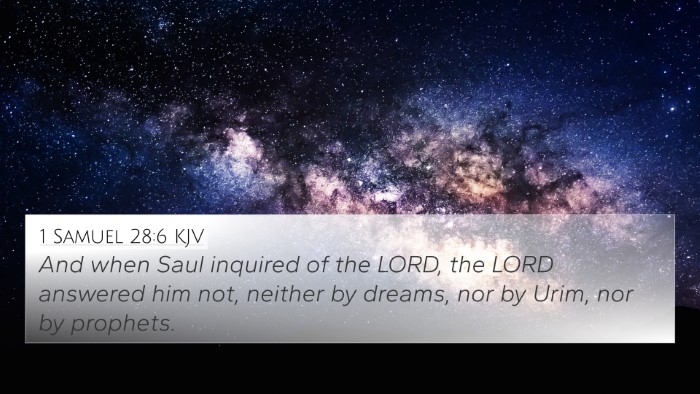Ezekiel 20:3 - Biblical Interpretation and Meaning
"Son of man, speak unto the elders of Israel, and say unto them, Thus saith the Lord God; Are ye come to inquire of me? As I live, saith the Lord God, I will not be inquired of by you." (Ezekiel 20:3, KJV)
This verse reflects a significant moment in the prophetic ministry of Ezekiel. It serves as a pivotal point in understanding the context behind God's dealings with Israel and their leaders.
Contextual Overview
The book of Ezekiel is rich with allegorical and prophetic insights concerning the fate of Israel during and after their Babylonian exile. Ezekiel was called to convey God’s messages, elucidating His intentions and the responses required from His people. In this passage, the elders of Israel are approaching the prophet to gain insight and direction from God.
Commentary Insights
- Matthew Henry: Henry notes that the elders’ intent to inquire signifies their acknowledgment of God's authority, yet He reveals their insincerity. God reproaches them, indicating that their inquiry is not aligned with a genuine desire for repentance.
- Albert Barnes: Barnes emphasizes the unworthiness of the elders, explaining that despite coming to seek guidance, their actions often reflected rebellion. God's refusal to answer signifies His judgment on their stubbornness.
- Adam Clarke: Clarke elaborates on the nature of divine inquiry, asserting that God seeks true repentance and devotion from His people. His refusal to engage with the elders is indicative of a need for a genuine heart change before receiving wisdom.
Thematic Connections
The verse encapsulates themes central to prophetic literature, particularly concerning hypocrisy and divine judgment. The elders represent a larger collective whose heart was not attuned to God, allowing the subsequent messages in Ezekiel to resonate with profound relevance throughout the text.
Bible Verse Cross-References
- Isaiah 1:15: God expresses displeasure with the prayers of a hypocritical people.
- Jeremiah 7:16: God instructs the prophet not to intercede for a people who have turned their hearts away.
- Amos 8:11: A famine of hearing God's word is foretold, reflecting a consequence of disobedience.
- Micah 3:7: The prophets will be ashamed as they fail to receive a message from God due to moral failures.
- Ezekiel 14:3: God questions the heart of those who come to the prophet with idols in their hearts.
- James 1:6: This New Testament verse echoes the necessity of sincere faith when asking of God.
- Matthew 15:8: Jesus cites Isaiah, saying that the people honor God with their lips while their hearts are far from Him.
Cross-Referencing Biblical Texts
This inquiry into Ezekiel 20:3 serves as a gateway to exploring various inter-Biblical dialogues. These connections reveal how the theme of divine judgment and the focus on a sincere relationship with God thread through both the Old and New Testaments.
Practical Insights
Understanding the refusal of God to answer the elders serves as a reminder for modern readers about the significance of approaching God with a humble and sincere heart. Engaging with the Scriptures necessitates a readiness for transformation rather than mere inquiry.
The need for a sincere heart in prayer and seeking God's guidance is timeless and applicable across generations.
Conclusion
Ezekiel 20:3 encapsulates a key lesson about the nature of divine inquiry, emphasizing the importance of authenticity in spiritual seeking. The broader narrative of Ezekiel encompasses themes of judgment, hope for restoration, and the necessity of a genuine relationship with God.
By cross-referencing various passages related to this theme, believers can gain a richer, more nuanced understanding of their own relationship with God, grounded in the truth and relevance of His word.
Engaging with Scripture
For those interested in studying how to find cross-references and connections among Bible verses, tools such as a Bible concordance or cross-reference Bible study guides can be invaluable resources. Whether preparing sermons or personal studies, identifying links between scriptures can deepen one's faith and understanding.

















